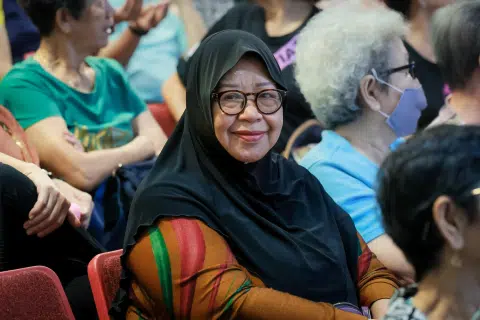Malnutrition on the rise among older Singaporeans
Malnutrition is a growing problem among seniors in Singapore, particularly those who are older and more frail, healthcare providers here have found.
Among hospital patients aged 65 and above, the proportion at risk of malnutrition rose from three in 10 in 2022 to four in 10 in 2024, according to data from NHG Health, one of three clusters that manage Singapore's public healthcare system.
Of the patients seen by dietitians at the point of discharge from hospital, the proportion who were malnourished or at risk also rose from 56 per cent to 66 per cent over the same period, said NHG Health.
Poor nutrition among the elderly here is worrying, said doctors, given that Singapore's population is rapidly ageing - some 24 per cent of citizens are projected to be aged 65 or older by 2030.
A separate study by the National University Health System (NUHS) of 475 adults aged above 60 found that the malnutrition rate was one in 10 among robust seniors, and one in six among those with some signs of frailty. The rate was much higher in frail and hospitalised older adults, said Associate Professor Reshma Merchant from the National University Hospital (NUH).
This is concerning as chronically poor nutrition contributes to increased frailty and a greater risk of falls and fractures, said Prof Reshma, who is head and senior consultant of NUH's division of geriatric medicine.
For instance, one-quarter of those at risk of malnutrition had at least one fall in the past year, compared with 15 per cent of those with no malnutrition risk. Malnutrition also makes older adults vulnerable to poorer outcomes of disease, hospitalisation and surgery, she added.
Prof Reshma noted that the latest data comes on the back of the Government's 2022 National Nutrition Survey, which found that one in two adults aged 50 to 69 did not meet the recommended intake of 20g to 30g of protein per meal - the equivalent of a palm-size piece of chicken breast.
This is even as the survey found that a majority of the population exceeded saturated fat and sodium intake recommendations.
"The fact that food is plentiful and available (here) does not necessarily prevent malnutrition, especially among certain sub-populations like older adults," said Prof Reshma.
She noted that older adults require higher protein intake to maintain muscle mass, even as ageing is often accompanied by reduced appetite, altered taste and feeling full more quickly.
Chronic illnesses such as diabetes or heart disease can also reduce appetite, while medications may impair the body's ability to absorb nutrients. Social isolation and depression can further suppress appetite, while financial constraints may push some to choose cheaper, nutrient-poor foods, she added.
NHG Health's Adjunct Associate Professor Lim Yen Peng said malnutrition slows recovery, affects mood and memory, and ultimately affects a person's quality of life and independence.
"That's why we need to act earlier - to prevent the onset and progression of malnutrition," said Prof Lim, who is also director of Group Allied Health and a senior principal dietitian.
In June, NHG Health launched EatWise SG, a national initiative to enhance access to nutrition care in the community. This wider roll-out followed its successful pilot in the healthcare cluster's institutions since April 2024.
More than 500 community care providers have to date been trained to recognise early signs of malnutrition and provide basic support, and there are plans to widen outreach through partnerships with home-based care teams and community organisations.
Meanwhile, NUH said it has been holding regular roadshows to raise nutrition awareness.
National University Polyclinics has been organising talks and cooking demonstrations. It has also produced booklets on healthy eating and meal planning, which can be accessed on its website.
The Government has identified good dietary habits as a key plank of its ongoing work to improve Singaporeans' health outcomes. At the recent SPH Media Asia Future Summit, Health Minister Ong Ye Kung said plans are in the works for programmes to get Singaporeans to reduce their consumption of salt and fat.
At a recent event in Boon Lay Community Club, organised by NUHS and its partners, seniors were taught how to adjust their diets as they aged, as well as simple meal-tracking techniques to learn more about their eating habits.
One participant, Ms Ijah Yatim, 73, said she realised her diet was strongly shaped by convenience.

"I have been eating whatever is in front of me, like goreng and fried food, and I need to cut down on oily food," said the retired travel manager.
"After the talk, I think I will eat more chicken for protein."
Chin Soo Fang for The Straits Times